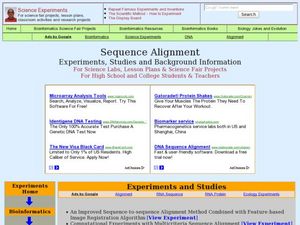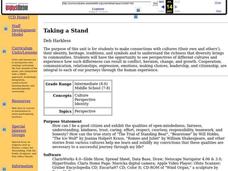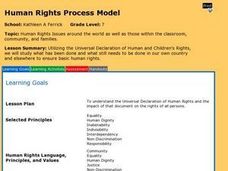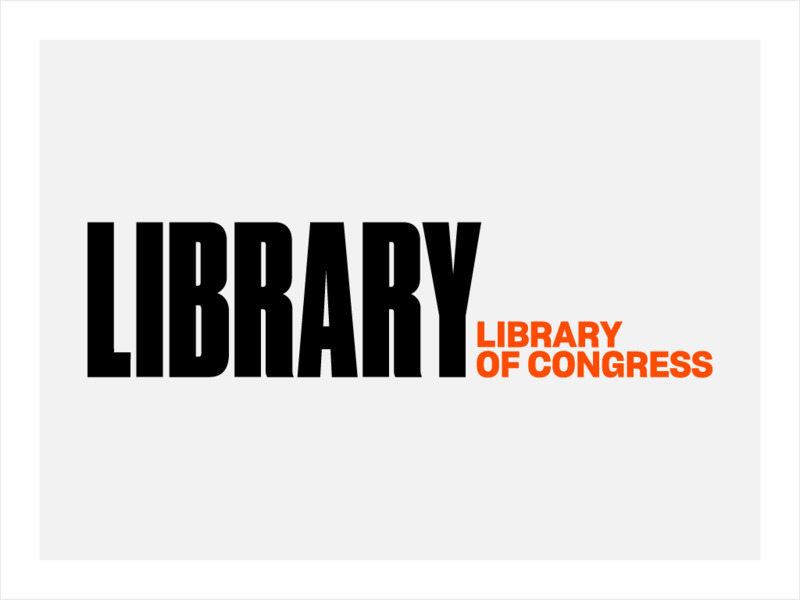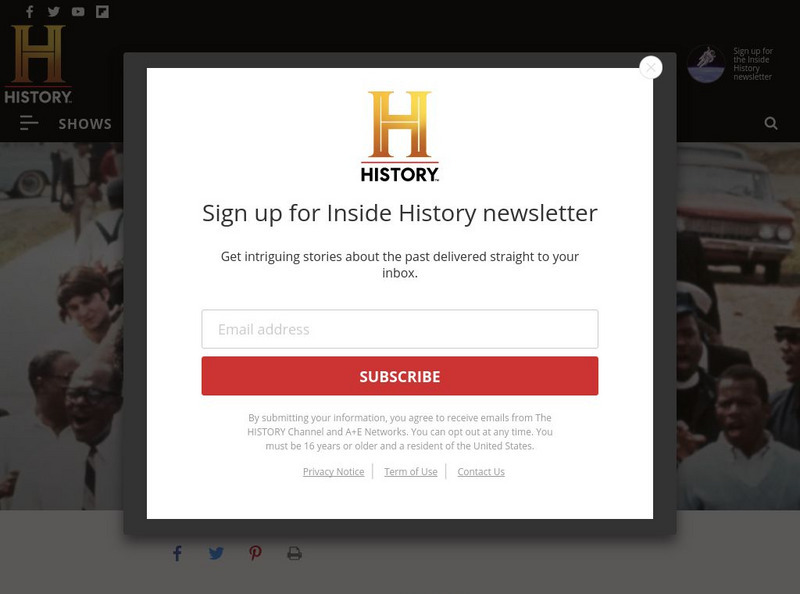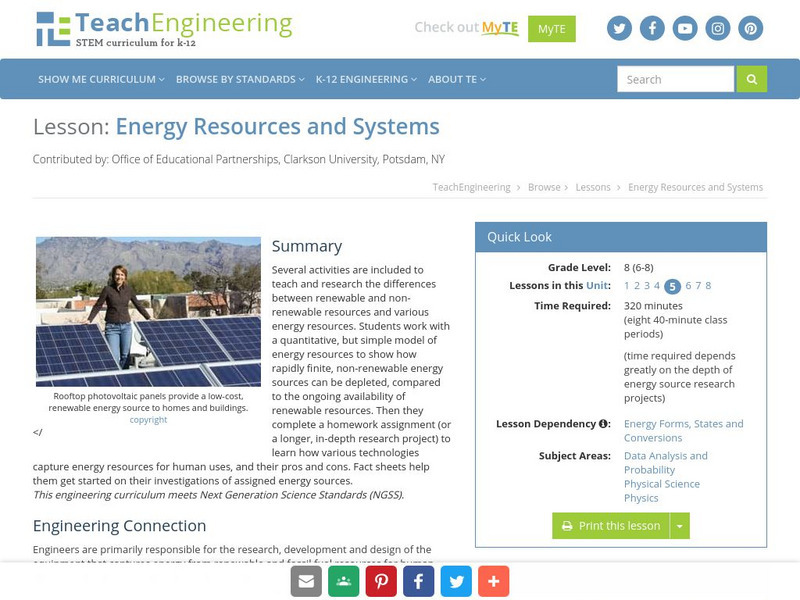Curated OER
Sequence Alignment
High schoolers explore the uses of sequence alignment. In this DNA lesson students complete several experiments on sequencing and algorithms.
Curated OER
Fast Forward
Students view a television program exploring social and economic changes at the close of the twentieth century. They discuss changes from differing perspectives including poor and rich citizens from various countries. Students write an...
Curated OER
Using the Internet for Research
Students are guided through a series of strategies to help them practice using the computer and become better Internet users. They follow steps in an exercise to practice search strategies and begin research on a topic for a research paper.
Curated OER
In the Eyes of the Beholder
Students investigate the relationship between the consumers and producers with the role that the government plays in the free enterprise system.
Curated OER
Basketball Rules!
Students examine the purpose for rules and laws by examining how basketball rules have changed.
Curated OER
Taking a Stand
Students make connections with cultures (their own and others'), their identity, heritage, traditions, and symbols and examine the richness that diversity brings to communities.
Curated OER
Coming to America
Students examine the various cultures of the immigrants who came to America. Using the internet, they research various ethnic and cultural groups within the United States. They identify the reasons why people immigrated to the U.S. and...
Curated OER
Periodic Table & Its Trends-Day 6
Learners intergrate science, technology and society into exploring the periodic table. They investigate one element of their choice and write a one page paper on the elements discovery, properties, uses, and the effect on society.
Curated OER
Boatbuilding Curriculum Outline
Students build a boat. They explore and examine the types of materials used in boat building. In groups, pupils copy their plans onto the plywood and begin to build the boat. During this fifteen day program, students follow instructions...
Curated OER
USH Test One
Eleventh graders write about one reason immigrants came to the United States in the late 1800's. They take a test that focuses upon past concepts and then an introduction is given by the teacher for the concepts of Imperialism and The...
Curated OER
Human Rights Issues Around the World
Seventh graders begin the lesson by comparing and contrasting the Bill of Rights with the Universal Declaration of Human Rights. For each document, they highlight the material that is the same for both and discuss the items that are...
Other
Ncte: Code of Best Practices in Fair Use for Media Literacy Education
From the National Council of Teachers of English, "this document is a code of best practices that helps educators using media literacy concepts and techniques to interpret the copyright doctrine of fair use." Use this site to help you...
TeachEngineering
Teach Engineering: Fairly Fundamental Facts About Forces & Structures
This instructional activity will introduce students to the five fundamental loads: compression, tension, shear, bending, and torsion.
Library of Congress
Loc: Today in History: January 5: Harry S. Truman
Find President Truman's State of the Union message on January 5, 1949, after his stunning victory over Thomas Dewey in November 1948, where he outlines his plans for a "Fair Deal" for Americans. In addition, there are links to other...
A&E Television
History.com: Black History Milestones
A detailed account of the history of African Americans is presented in this article. Divided by main topics or periods of time, the coming of slavery to America is the first focus. Followed by plantation life and escapes to freedom and...
TeachEngineering
Teach Engineering: State Your Position
To navigate, you must know roughly where you stand relative to your designation, so you can head in the right direction. In locations where landmarks are not available to help navigate (in deserts, on seas), objects in the sky are the...
TeachEngineering
Teach Engineering: Tools and Equipment, Part I
Through a series of activities, students discover that the concept of mechanical advantage describes reality fairly well. They act as engineers creating a design for a ramp at a construction site by measuring four different inclined...
TeachEngineering
Teach Engineering: Where Are the Plastics Near Me? (Mapping the Data)
In a student-led and fairly independent fashion, data collected in the associated field trip activity are organized by student groups to create useful and informative Google Earth maps. Each team creates a map, uses that map to analyze...
Lumen Learning
Lumen: Multimodality: Remix and Attribution
This lesson focuses on defining remix, why attribution is important in a remix, and how to attribute fairly. It also provides a table, Limitations When Remixing Copyrighted Work, and a practice exercise. CCSS.ELA-Literacy.CCRA.W.8
TeachEngineering
Teach Engineering: The Great Divide
In this activity, students will use cookies to simulate the distribution of our nonrenewable resources (energy). Then, they will discuss how the world's growing population affects the fairness and effectiveness of this distribution of...
TeachEngineering
Teach Engineering: Naturally Speaking
In this lesson, students will identify the Earth's natural resources and classify them as renewable or non-renewable. They will simulate the distribution of resources and discuss the fairness and effectiveness of the distribution....
Wolfram Research
Wolfram Math World: Green's Theorem
This site from MathWorld is a good site explaining Green's Theorem. The information presented is fairly brief but very helpful, and several formulas and examples are given along with links to additional information.
Live Wire Media
Good Character: Character Education
This site is loaded with resources for developing and maintaining a character education program in your school, class or team. It includes information on service learning, ethics in the workplace and leading class discussions as well as...
TeachEngineering
Teach Engineering: Energy Resources and Systems
Several activities are included to teach and research the differences between renewable and non-renewable resources and various energy resources. Students work with a quantitative, but simple model of energy resources to show how rapidly...


